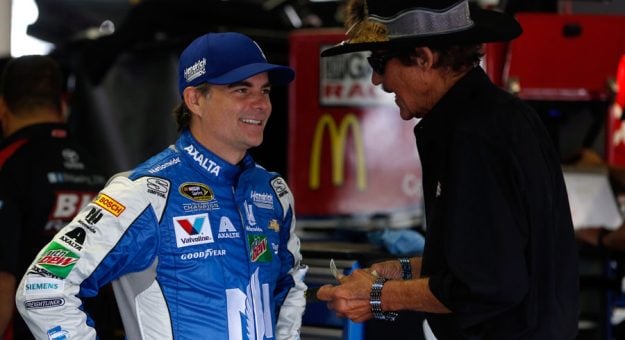CONCORD, N.C. — Let’s continue a theme I’ve played with for a while: It’s been 30 years since one legend stepped out of NASCAR on the same day — in the same race — that another one stepped in.
At Atlanta Motor Speedway on Nov. 15, 1992, Richard Petty completed his 1,184th and final NASCAR Cup Series race. That day, the King finished 35th, completing 95 of the 328 laps in his familiar STP Pontiac.
On the same day, Jeff Gordon competed in his first NASCAR Cup Series race, driving Rick Hendrick’s No. 24 DuPont Chevrolet. The then-20-year-old driver completed just 164 of the 328 laps.
Petty drove around the track one last time before coming into the pits for the final time as a driver, sealing a career that netted 200 victories, seven championships and a world-wide following.
Gordon ended his first full-time season in 1993 14th in the points, with seven top-five results and 11 top-10 finishes.
The fact that one legend retired at the same time as another got started is sort of unique, as things are measured. There is the fullness of time to consider and the perception of each driver is always measured against the other.
That usually doesn’t work out in an apples-to-apples way, considering the way the sport changes from year to year and era to era.
Petty was the son of one of NASCAR’s earliest heroes. Gordon was a kid from California who grew up driving sprint cars and midgets in the Midwest.
Petty did much of the work on his cars himself as part of the family business, along with his father Lee, brother Maurice and cousin Dale Inman
Gordon did some of that, but probably not to the extent of building engines and the like.
The two eras — the one in which Petty started and the one in which Gordon started — could not be more different.
Family-owned teams were the norm with the Petty family, while paid drivers ruled the roost in Gordon’s beginnings. Big money was flowing into NASCAR in 1992.
For comparison’s sake, Petty earned $41,873 in his first full season, running 40 of 44 races. Gordon’s first full season in 1993 paid the young driver $765,168 for 30 races. That was purse money. I don’t know how much Gordon was paid by team owner Hendrick, but it was likely a king’s ransom — if you’ll pardon the pun.
There were no dirt tracks in Gordon’s career in NASCAR. Petty raced on them a lot.
In terms of Daytona 500s, Petty won seven of them while Gordon only took three — and I use the term only simply for comparison. Petty won seven championships to Gordon’s four. Petty won 200 races — a mark that will likely never be broken — and Gordon won 93.
The numbers say Petty was more successful in those categories. The reality is, both were successful at about the same rate in different eras.
Petty’s seven titles spanned 16 seasons. Gordon’s four spanned just seven. A compressed schedule, fixed car count and a surfeit of teams with the money and technical means to compete narrows the gap, but there is no way to truly measure who was more successful overall.
Dale Earnhardt also won seven championships over 15 seasons and he won 76 races, bridging the gap between Petty and Gordon.
You can make an educated guess about who the greatest driver of all time in NASCAR history is, but it will be subjective in nature no matter what conclusion you draw.
That’s the fun part.
Making cases and proving them out still leaves plenty of speculation and assumption — and topics to write about.
